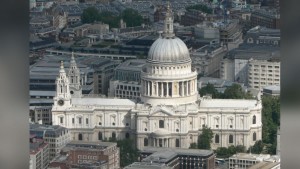Police refuse to remove man from ‘place of worship’
By WND
Two separate incidents in which London police arrested a man reading the Bible outside the city’s iconic St. Paul’s Cathedral illustrate an erosion of religious freedom in the U.K., a Christian legal advocacy group contends.
Freedom to read the Bible in public was one of the first aspects of freedom of religion to be legally established in England, notes the Barnabas Fund.
A video shows police justifying their actions by stating that the cathedral staff asked them to remove anyone reading from the Bible in the public precinct in front of St Paul’s cathedral, which is owned by the church.
 A second video, from several months ago, however, shows a police officer objecting to the church’s request.
A second video, from several months ago, however, shows a police officer objecting to the church’s request.
“I am of the opinion that this chap isn’t causing any breach of the peace. This chap isn’t impeding anyone. I am happy for him to stay here,” the officer said.
However, a member of the cathedral staff told the officer “the registrar and the dean and the chapter have given instructions to the head of security that at any time he shows up he should be asked to leave and we are just following those orders.”
The police officer further stood his ground, however. “This chap is reading from the Bible. I feel it would be remiss of me to move him on in a place of worship.”
Barnabas pointed out the man was reading from the “Sermon on the Mount” in Matthew 5, which includes the verses: “Blessed are they which are persecuted for righteousness’ sake: for theirs is the kingdom of heaven. Blessed are ye, when men shall revile you, and persecute you, and shall say all manner of evil against you falsely, for my sake.”
Recalling history, Barnabas noted that in 1537, just a year after Tyndale had been burned at the stake for translating the Bible into English, King Henry VIII issued a royal decree making it legal to read the Bible publicly.
Then, in 1538, Henry’s chief minister, Thomas Cromwell, instructed clergy to place an English Bible in every parish church in the country and ordering that “ye shall discourage no man privily or apertly from the reading or hearing of the said Bible, but shall expressly provoke, stir, and exhort every person to read the same, as that which is the very lively word of God, that every Christian man is bound to embrace, believe and follow if he look to be saved.”
Barnabas said the freedom to read the Bible “is part of the very foundation of the Church of England, which was established only four years earlier.” “Yet cathedral authorities are now doing exactly the opposite of what the injunctions to clergy set out in early years of the Church of England.”
Barnabas also argued there is no reason for the cathedral staff to involve the police because trespass, under English law, is a civil matter, not a criminal offense. Also, Barnabas said, there have been far more disruptive protesters in front of St. Paul’s, including in 2011, when the area was occupied by hard left Occupy London anti-capitalism protesters who set up camp there for months.
The dean of St Paul’s, in fact, resigned in protest at legal attempts to evict the leftist protesters, even though that had at one stage forced the closure of the cathedral.
“What we are seeing is our heritage of freedom of religion sliding further down a slippery slope,” Barnabas said. “It is important that we look back and see how much freedom has been lost in just the last two decades.”
Throughout almost the entire 20th century, Barnabas said, there were no prosecutions of street preachers. In 1997, two evangelists preaching on the steps of Wakefield Cathedral were arrested, although freed on appeal two years later.
“However, in the last decade we have lost count of the number of street preachers who have been arrested by police, with a great many subsequently being released without charge or acquitted by the courts,” Barnabas said.
Last year at the trial of two street preachers, the Crown Prosecution Service claimed that quoting from the King James Bible in public “in the context of modern British society must be considered to be abusive and is a criminal matter.”
“Now we have cathedral authorities seeking to prevent people publicly reading the Bible in front of a cathedral,” Barnabas said.
“This relentless erosion of such public expressions of faith illustrates why it is so important that all aspects of freedom of religion, which historically developed in the U.K., should be fully incorporated into U.K. law.”







